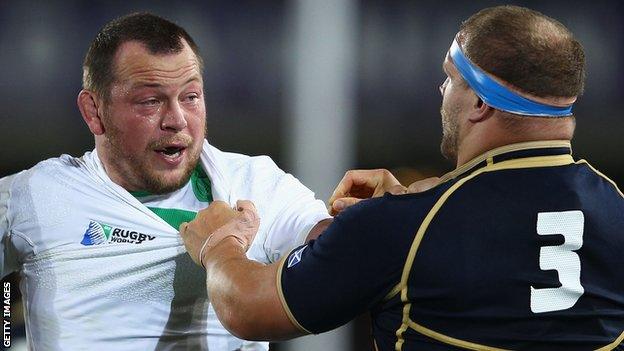Rugby and brain injuries: Game's concussion options 'limited' says ex-World Rugby medical advisor
- Published
'The brain does not regenerate' - Doctor's concern at rugby's dementia crisis
Ex-World Rugby medical advisor Dr Barry O'Driscoll believes the sport's room for manoeuvre to reduce concussion injuries may be limited.
The ex-Ireland full-back resigned from his role in 2012 over the way the sport was dealing with the concussion issue.
He remains highly critical of rugby's Head Injury Assessment (HIA) system but says further law changes aimed at safety could prove impractical.
"I'm not sure how much more they can do or it won't be rugby," he said.
O'Driscoll does applaud the law changes which have seen head contacts clamped down on in addition to changes at scrum time but says further alterations to the rulebook could reduce the game to "touch rugby or not an awful lot more".
"They have been very good about stopping the head contacts which is only in the last year or so.
"Any head contact is penalised straight away and that's helped. They've done well in the scrums in that they used to charge at each other from five yards. Now they must get down. They are two very good moves."

Steve Thompson (left) won a World Cup medal with England in 2003 but has been diagnosed with dementia
Former players set to claim for negligence
But beyond that, O'Driscoll believes the increasing physicality, size and speed engendered by the professional era makes dangerous collisions inevitable.
"The impact which is what damages the brain is as a result of the weight multiplied by the acceleration. There's nothing you can do about that. You tell people to get lighter and not to eat?"
The Irishman, a second cousin of former Ireland captain Brian O'Driscoll, was speaking in the wake of last week's revelation that a group of former players including 2003 England World Cup winner Steve Thompson are in the process of starting a claim against the game's authorities for negligence after claiming the sport has left them with permanent brain damage.
Former England women's World Cup winner Kat Merchant, who retired on medical advice aged 28 in 2014 after 11 confirmed concussions in 14 seasons, also told BBC Sport this week that rugby has left her with "lower cognitive capacity".
O'Driscoll believes rugby players and indeed parents of children playing the game could soon have to sign paperwork outlining that they are aware of the risks involved in the sport.
"People have got to be told (of the risks) and make the choice. We may finish up where like in the situation of a hospital operation, where the surgeon will come and see you and you will sign a piece of paper that has got every possible side-effect that could happen from this operation. It's going to happen in rugby.
"You will sign that as a parent knowing your child cognitively might be doing O-Levels and it (rugby) might be just affecting it."
'HIA system dreadful'
O'Driscoll resigned from his position on then International Rugby Board's medical committee in disgust at plans to introduce a five-minute, pitch-side assessment for players suspected of concussion.
He continues to be implacably opposed to the HIA process which sees players examined for around 10 minutes before a decision is made whether they can resume action.
"You cannot rule concussion out in five, 10, 15 minutes. Lots of people get their headaches later that night of start vomiting later that night.
"The symptoms come up in the next 24 to 48 hours so a 10-minute or 15 minute assessment cannot rule out concussion if you suspect it.
"It's dreadful what they are doing with the HIA. They can stop that but then there's a worry that that will affect the game because will have so many players coming off."
World Rugby says anyone displaying clear concussion symptoms is removed permanently without an HIA required.